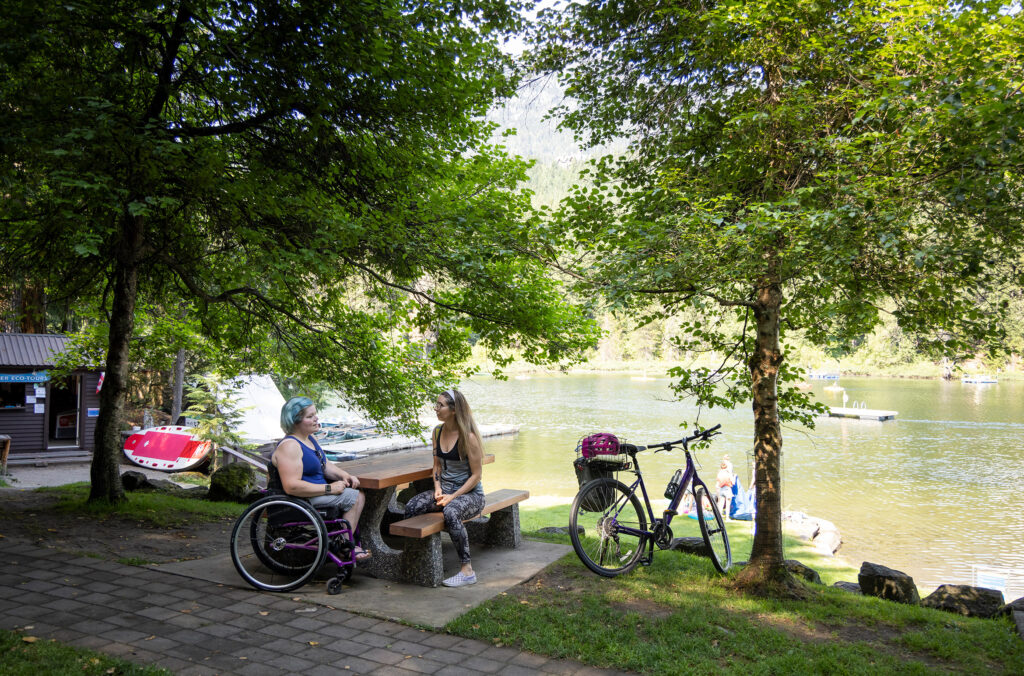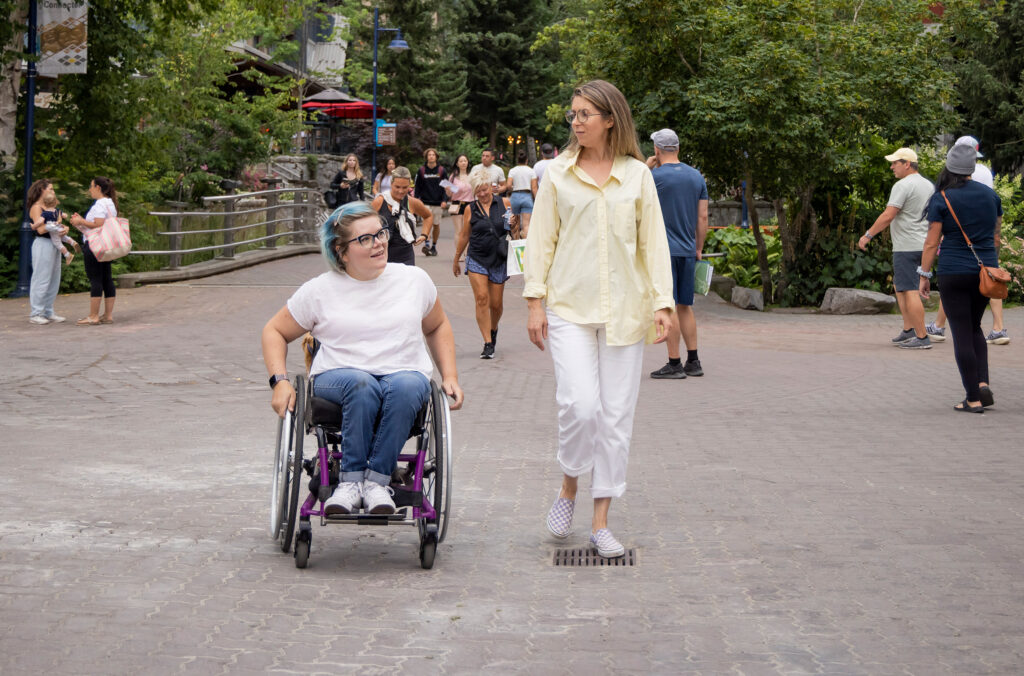My first question for this blog to Sarah Tipler, Accessibility Coordinator at the Resort Municipality of Whistler was, “Is Whistler an accessible place to visit? Her answer was, “Yes. BUT…” and so, with the goal of giving wheelchair travellers useful advice for coming to Whistler, I dug in.
Making travel plans is usually an undertaking that involves some research, but for those in a wheelchair, it requires a lot more. After writing this post, I had a new appreciation for how individual and nuanced this information needs to be, and how it requires a lot of dedication and patience on the part of the wheelchair traveller.

In this article, I spoke with the Resort Municipality of Whistler (RMOW), Whistler Blackcomb, Whistler Adaptive Sports Program (WASP) and two local wheelchair users, Olivia Rey and Alex Cairns, to put together some travel tips, highlight some pain points and check in on any wheelchair-related plans for the future.
12 Tips for Exploring Whistler by Wheelchair
- Take a look at the RMOW’s Accessible Map for how to navigate Whistler Village. This was the number one thing that everyone I spoke to suggested. It’s a comprehensive map of Whistler Village showing accessible parking spaces, barrier-free routes, slopes with gradients, accessible washrooms and more. The accessibility resources on Whistler.ca provide a range of resources to assist with your visit; from fueling your vehicle while in Whistler, to getting medical supplies and finding out the accessibility of a municipal facility, etc.
- Stay in central accommodation. Although Whistler’s Transit is easy-access and has spaces for wheelchairs (two per bus), not all the bus stops outside of Whistler Village are accessible, meaning that they lack sidewalks for the bus ramps to deploy onto increasing the slope of the ramp. There’s a limited number of accessible taxis that can take a wheelchair, which can make getting around (especially in winter) difficult. Whistler.com has a general knowledge of what each hotel offers in terms of accessibility, so contact them to chat about the best option for you.
- Bring your accessible parking permit as the RMOW honours these and can issue a temporary one ($31) if you’ve left yours at home. Please note that if your disability is invisible this may require a doctor’s note to confirm the disability. More details can be found on the RMOW website.
- Book restaurants in advance and tell them you need wheelchair accessibility so they can plan ahead and create a pathway to your table. Note that some of Whistler’s restaurants are located in older buildings that are not necessarily wheelchair accessible.
- If you’re looking to do some activities while you’re in Whistler, contact Whistler Adaptive Sports (WASP), who offer alpine and Nordic sit-skiing in the winter and hand-cycling, water sports and trail riders for hiking. It’s best to contact them as far in advance as possible and chat through what you’re thinking with their incredibly passionate and knowledgeable team. Whistler Adaptive can also provide a complimentary companion pass to access Whistler Blackcomb. This is for a support companion or family member even if you are not accessing programming through Whistler Adaptive. This should be organized in advance of accessing the mountain.
- Exploring the apline is one of Whistler’s key features, and Whistler Blackcomb has a dedicated accessibility page with general information on how to access sightseeing, skiing and biking via a wheelchair and with adaptive equipment. If you’re coming in the summer there’s a handy video showing you how to load an adaptive bike into the gondola and onto lifts, and they’re developing more know-before-you-go videos for the winter.
- If you’re coming to explore and recreate on Whistler Blackcomb, the closest parking to the Whistler Village Gondola (WVG) is in the Sundial area, or if you’re accessing Blackcomb via the Blackcomb Gondola, then there are two accessible parking spaces by the Blackcomb Administration building at the base of the mountain. Whistler Mountain is a more accessible environment as the WVG allows an individual to travel in their wheelchair up the gondola with their sit-ski or adaptive mountain bike and leave their chair at the top of the mountain in a secure location to easily transfer into at lunchtime or to use the washroom facilities in the Roundhouse Lodge if needed.
- Olivia is a fan of the AccessNow app, which pin-points accessible places around the world by letting users find and rate the accessibility of restaurants, hotels, stores, bars and more.
- If you’re a skier, ask about the Ruper Rollers (more below).
- The Valley Trail is a paved, pedestrianized trail which weaves for 46 kilometres around Whistler’s neighbourhoods, parks and lakes is a great way to explore (although it’s good to note there are some steep sections). The lakes are easy to get to, and all have good washrooms and paths to the water. Each park has complimentary, accessible parking spots. For more on what accessible facilities are at each park, visit the RMOW website.
- The Dubh Linn Gate, Blacks, Tapley’s, GLC (elevator) and Dusty’s come up as some of the most accessible après options.
- Although some restrictions apply, a lot of Whistler’s activities are available to those in a wheelchair, including water sports, bobsleigh and ATV riding. Take a look at the RMOW website for more details on these.
Innovation in the Accessibility Space
The RMOW has incorporated accessibility and inclusion into the municipality’s guiding policy documents and considers the Accessible Canada Act and the Accessible BC Act as municipal policies and plans are created and updated.
Universal Design (UD) is a key accessibility concept and a UD philosophy is included as a policy objective in the RMOW’s newly proposed OCP, which is currently at third reading and can be viewed on the RMOW website.
“The dynamic wheelchair symbol can now be found on our wayfinding signage,” says Sarah. “It’s an example of a more inclusive and thoughtful approach to icon and sign usage, and discussions about people with disabilities not being passive. Six municipal facilities, including Meadow Park Sports Centre, Whistler Public Library, Maury Young Arts Centre, Myrtle Philip Community Centre, Whistler Olympic Plaza, have received the Rick Hansen Foundation Accessibility Certification and the washrooms at Whistler Olympic Plaza have received the RHF Accessibility Certified Gold.“
Whistler Blackcomb also utilized the Rick Hansen Foundation Accessibility Certification program, which performed an audit of a few of their key facilities mid-way through last summer enabling them to put some of the changes into their capital planning for this year.
The RMOW also has an Accessibility and Inclusion Committee (AIC) that works collaboratively to assess and improve community accessibility and inclusion focusing on the experiences of people with disabilities, but encompassing the whole community.
Rupert Rollers
I spoke with Peter Tongue, Lift Operations Manager at Whistler Blackcomb and he told me about a local invention that’s helping sit skiers access the mountains with more ease.
“I don’t have a background in accessibility,” said Peter. “I know I have to ask those who do or have direct life experience. I was lucky enough to share a workspace with Carly Fox, a WASP supervisor this winter so I could bounce ideas off her. I came from a different ski hill before Whistler Blackcomb, and the bandwidth to do tests and try things in this space is supported here.”
He went on to say that one of the huge winter accessibility wins is the Rupert Rollers, developed by a colleague (called Rupert) who, at the time, worked in lift ops. After the Wizard and Solar Coaster chairs were replaced, sit skiers had a harder time accessing the slopes via the gondola (sit skis glide on snow which reaches the base of the chairlifts unlike the gondolas, which are accessed by foot as the snow doesn’t reach their base). Rupert watched his sit-skier friend struggle. He now needed to bring his wheelchair and sit-ski, making the whole process more complex, time-consuming and tiring.
Along with a member of the snow-making team, Kyle, Rupert came up with a frame on wheels, which sit skiers could slide onto. It can be pushed or used independently. Vail Resorts supported the invention and bought two of them.
It’s not without its issues and Peter mentioned they’re constantly learning.
‘Last year we realized that the Rupert Rollers don’t work with the Excalibur Gondola as there’s a step up,” says Peter. “Last spring we didn’t have the Blackcomb Gondola as it was being serviced, which forced us to find a solution for Excalibur. We put in some really simple ramps, which allow people to use the Rupert Roller. Dopplemyer, who make a lot of our infrastrucutre are thinking about accessibility more and more. Everyone comes together to make these ideas happen, they want to see more people having fun on the mountains.”
I asked Peter what’s the best way to connect with the Whistler Blackcomb team if there’s a question about accessibility and he said to contact Guest Services, who will either have the information or direct the inquiry to the right person on the team.
Invictus Games Vancouver Whistler 2025
Whistler is due to host the first Invictus Games to include both winter and summer sports happening February 6 to 17, 2025. The Invictus Games Vancouver Whistler 2025 is an international adaptive sporting competition for wounded, injured and sick service personnel and Veterans.
For the first time in Invictus Games history, winter sports events have been introduced to the competition, including Alpine Skiing, Alpine Snowboarding, Biathlon, Nordic Skiing, Skeleton and Wheelchair Curling. This is in addition to the core Invictus Games sports of indoor rowing, sitting volleyball, swimming, wheelchair rugby and wheelchair basketball.
Team managers from participating nations recently participated in an Adaptive Winter Sports Camp, intended to familiarize participants with the winter sports. The CEO of 2025 Invictus Games, Peter Lawless, told the Pique NewsMagazine…
“The beauty of Whistler having hosted the 2010 Olympic and Paralympic Games is that the venues are there,” said Lawless. “They’re world-class facilities, they’re world-class mountains, and we have the luxury of just sort of dropping in and putting on our own world-class event.”
The Games are a demonstration and celebration of the human spirit and you’re invited to be part of it all next February. Competition locations in Whistler include Alpine Skiing and Snowboarding on Whistler Mountain, Nordic Skiing and Biathlon at Whistler Olympic Park and Skeleton at the Whistler Sliding Centre. Keep an eye out for the schedule by signing up for the Invictus newsletter and consider volunteering for an even deeper experience during these exciting sporting events.
Pain Points to be Aware Of
- Getting to Whistler. At the moment, there are no shuttle companies that can transport power wheelchair users to Whistler (these are private companies and not under the influence of the RMOW). It’s also difficult for people using a manual wheelchair, as although the chair can be stowed, there are often steps to navigate to get into the shuttles. Private transport or a rental car/van are the only options, which the RMOW lists on their website. One that WASP mentioned is the Modo van.
- Both Alex and Olivia mentioned that Whistler Village can be a bit of a maze to navigate, and warn that there are slopes and interlocking pavers. Their tip is to get well acquainted with the accessibility map.
- Marketplace (privately owned land, not RMOW property) is not very accessible from the accessible parking as the ramps are steep and there are curbs to contend with.
- Parking in the Day Lots can be an issue with heavy snowfall. Even though they are cleared, it takes time for that to be done, making it hard to get to the gondolas from this area particularly if you are transporting your adaptive equipment.
- For some of Whistler’s nightclubs, you have to wheel around to the underground parking to get in, which can mean leaving your friends and wheeling around in the snow and wet.
Useful Websites for Accessible Travel in British Columbia
- Spinal Cord Injury BC – Downloadable travel guide.
- Hello BC has an online list of accessible accommodations. The assessments are done by the property themselves and might not be as accurate as by being assessed by someone with lived experience. These listings will provide you with details related to accessibility on things like parking, food and beverage, elevators and restrooms.
- AccessNow app
Whistler Insider Stories and How-Tos
- Whistler Adaptive Sports: Making Skiing Happen
- The Return of Joy: An Unexpected Crankworx Story
- Whistler Summer Wish List: Bear Tours & Escape Rooms
- How a Family of Five Does Whistler With a Wheelchair
- Whistler Shredder Alex Cairns heads to PyeongChang
If you’re planning a trip to Whistler, let the locally-based Whistler.com team help you with the planning logistics, call them at 1.800.944.7853.
Spring offers great value with savings of up to 25% on lodging. Stretch your stay into midweek for even more savings and a quieter village. For every third night you book between March 1 - April 30, 2025, receive a free $75 CAD Whistler Après Voucher.
For summer, book ahead and save up to 30% on lodging. Plus, you'll receive a free $150 CAD Activity Voucher on stays of 3 or more nights.
Insider Tip: BC or Washington resident? Sign up for Whistler Rewards to access additional savings and exclusive perks.


